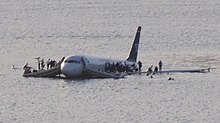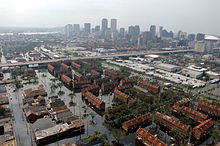Property insurance provides protection against risks to property, such as fire, theft or weather damage. This may include specialized forms of insurance such as fire insurance, flood insurance, earthquake insurance, home insurance, inland marine insurance or boiler insurance. The term property insurance may, like casualty insurance, be used as a broad category of various subtypes of insurance, some of which are listed below:
- Aviation insurance protects aircraft hulls and spares, and associated liability risks, such as passenger and third-party liability. Airports may also appear under this subcategory, including air traffic control and refuelling operations for international airports through to smaller domestic exposures.
- Boiler insurance (also known as boiler and machinery insurance, or equipment breakdown insurance) insures against accidental physical damage to boilers, equipment or machinery.
- Builder's risk insurance insures against the risk of physical loss or damage to property during construction. Builder's risk insurance is typically written on an "all risk" basis covering damage arising from any cause (including the negligence of the insured) not otherwise expressly excluded. Builder's risk insurance is coverage that protects a person's or organization's insurable interest in materials, fixtures and/or equipment being used in the construction or renovation of a building or structure should those items sustain physical loss or damage from an insured peril.
- Crop insurance may be purchased by farmers to reduce or manage various risks associated with growing crops. Such risks include crop loss or damage caused by weather, hail, drought, frost damage, insects, or disease.
- Earthquake insurance is a form of property insurance that pays the policyholder in the event of an earthquake that causes damage to the property. Most ordinary home insurance policies do not cover earthquake damage. Earthquake insurance policies generally feature a high deductible. Rates depend on location and hence the likelihood of an earthquake, as well as the construction of the home.
- Fidelity bond is a form of casualty insurance that covers policyholders for losses incurred as a result of fraudulent acts by specified individuals. It usually insures a business for losses caused by the dishonest acts of its employees.
- Flood insurance protects against property loss due to flooding. Many insurers in the US do not provide flood insurance in some parts of the country. In response to this, the federal government created the National Flood Insurance Program which serves as the insurer of last resort.
- Home insurance, also commonly called hazard insurance, or homeowners insurance (often abbreviated in the real estate industry as HOI), is the type of property insurance that covers private homes, as outlined above.
- Landlord insurance covers residential and commercial properties which are rented to others. Most homeowners' insurance covers only owner-occupied homes.
- Marine insurance and marine cargo insurance cover the loss or damage of vessels at sea or on inland waterways, and of cargo in transit, regardless of the method of transit. When the owner of the cargo and the carrier are separate corporations, marine cargo insurance typically compensates the owner of cargo for losses sustained from fire, shipwreck, etc., but excludes losses that can be recovered from the carrier or the carrier's insurance. Many marine insurance underwriters will include "time element" coverage in such policies, which extends the indemnity to cover loss of profit and other business expenses attributable to the delay caused by a covered loss.
- Supplemental natural disaster insurance covers specified expenses after a natural disaster renders the policyholder's home uninhabitable. Periodic payments are made directly to the insured until the home is rebuilt or a specified time period has elapsed.
- Surety bond insurance is a three-party insurance guaranteeing the performance of the principal.
- Terrorism insurance provides protection against any loss or damage caused by terrorist activities. In the US in the wake of 9/11, the Terrorism Risk Insurance Act 2002 (TRIA) set up a federal Program providing a transparent system of shared public and private compensation for insured losses resulting from acts of terrorism. The program was extended until the end of 2014 by the Terrorism Risk Insurance Program Reauthorization Act 2007 (TRIPRA).
- Volcano insurance is a specialized insurance protecting against damage arising specifically from volcanic eruptions.
- Windstorm insurance is an insurance covering the damage that can be caused by wind events such as hurricanes.




thanks for sharing such a important information sharing with us...manufacturing of clc light weight bricks/blocks machinery in india
ReplyDelete